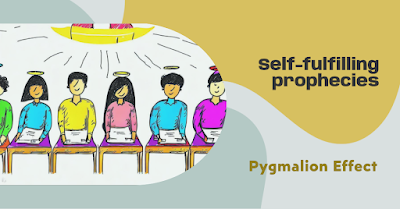A self-fulfilling prophecy is a process that leads to actions confirming that a previously held false belief is true.
Essentially, in a self-fulfilling prophecy, expectations influence behavior consistent with the expectations.
The self-fulfilling prophecy is also called the Pygmalion Effect and the Rosenthal Effect.
Pygmalion Effect or Rosenthal Effect
Robert Rosenthal and Lenore Jacobsen studied teacher expectations in an experiment. False information about one group of students led to measurable improvements. The self-fulfilling prophecy was called the Pygmalion effect.
Self-Fulfilling Prophecy
Robert K. Merton defines a self-fulfilling prophecy as a false definition of a situation, which causes a behavior that, in turn, makes the initial false conception come true. As a general representation of a specific relation between beliefs and reality, the concept of self-fulfilling prophecy is useful to describe and analyze manifold kinds of psychological and social phenomena. Broadly speaking, we can say that the concept of self-fulfilling prophecy highlights the huge power of our conceptual frameworks and beliefs: they not only shape the way in which we see the reality, but they can also determine the reality itself. [Bold emphasis added] Source: (Martire, 2017, December 4)The placebo effect is one example of a self-fulfilling prophecy.
Educators' expectations about the high or low abilities of students may influence how well students perform. See the Pygmalion Effect and Rosenthal above.
Experimenter bias can lead to expected performance of research subjects. For example, rats randomly assigned to "bright" or "dull" conditions performed differently based on the descriptive label. See Rosenthal & Fode (1963).
The biased interrogation of suspects considered guilty may bring innocent people to the point of a false confession of a crime. See Kassin et al. (2003).
Supervisors may influence production based on expectations of workers.
Group stereotypes may be validated when the people in the group are treated by influential people based on false belief-based expectations of a group.
Who holds expectations?
Most of us have expectations about ourselves and others. Expectations can lead to self-fulfilling prophecies.
Consider students new to a school where they have a few different teachers. The list of people with expectations could be overwhelming if they are highly discrepant.
Here's a hypothetical list of people who may express expectation and thereby create a self-fulfilling prophecy for students.
Parent 1
Parent 2
Teacher 1
Teacher 2
Teacher 3
Teacher 4
Coach or similar leader
Close friend 1
Close friend 2
and finally,
The Student
Religious children may add more people conveying expectations about their behavior.
For example:
Perception of God's expectations
Clergy or church leader's expectations
Emotions
Self-fulfilling prophecies can be linked to powerful feelings.
Sometimes there is the joy of success.
Sometimes there is the sadness that come with "not measuring up."
Sometimes there's anger and frustration.
Managing expectations can be exasperating.
Sometimes a child or an adult needs help dealing with unrealistic expectations before they turn into a negative self-fulfilling prophecy.
References
Kassin, S. M., Goldstein, C. C., and Savitsky, K. (2003). Behavioral confirmation in the interrogation room: On the dangers of presuming guilt. Law and Human Behavior 27, 187-203.https://doi.org/10.2307/4609267
Geoffrey W. Sutton, PhD is Emeritus Professor of Psychology. He retired from a clinical practice and was credentialed in clinical neuropsychology and psychopharmacology. His website is www.suttong.com
See Geoffrey Sutton’s books on AMAZON or GOOGLE STORE
Follow on FACEBOOK Geoff W. Sutton
TWITTER @Geoff.W.Sutton
You can read many published articles at no charge:
Academia Geoff W Sutton ResearchGate Geoffrey W Sutton
Dr. Sutton’s posts are for educational purposes only. See a licensed mental health provider for diagnoses, treatment, and consultation.

Comments